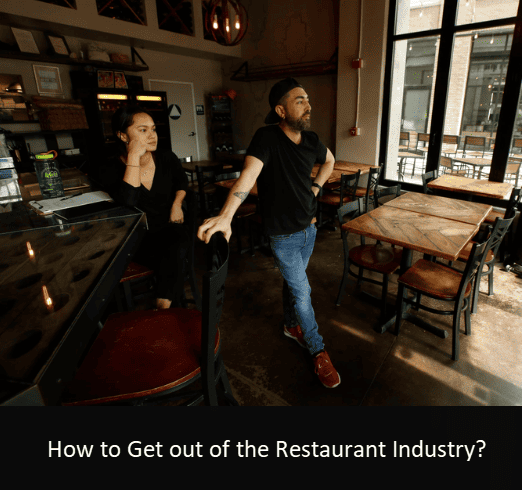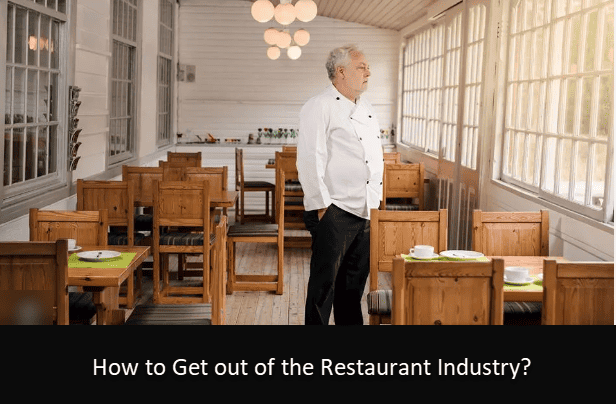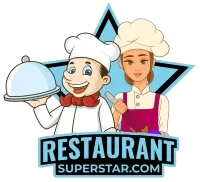How to Get out of the Restaurant Industry

Are you looking for How to Get out of the Restaurant Industry? The first step is understanding your motivations and leveraging your skills for a new path.
Take heart; you’re not alone. Beyond the kitchen doors or the host stand, a world of opportunities awaits you. Let’s explore them together.
How to Get out of the Restaurant Industry?
To transition out of the restaurant industry, follow these steps:
1. Assess your career goals, skills, and work preferences. Utilize online assessments or quizzes to identify your strengths and passions.
2. Research job listings that match your goals and abilities. Tap into platforms like LinkedIn, Indeed, and Glassdoor. Network with professionals in your desired fields for advice and referrals.
3. Identify transferable skills gained from your restaurant experience, like customer service, communication, teamwork, problem-solving, multitasking, and time management. Highlight these on your resume, cover letter, and during interviews.
Hey there,
I’m Jeff, a restaurant consultant based in sunny Florida. But my journey hasn’t always been as a consultant. I’ve worked in hot kitchens, mixed cocktails at lively bars, and greeted countless guests with a smile, enduring grueling hours in the food service industry.
I understand firsthand the challenges, burnout, and desire for change you might feel right now.
And guess what?
There’s nothing wrong with wanting a change. While the restaurant industry can be rewarding, it’s not for everyone. The long hours, high pressure, and erratic schedules can take a toll. If you’ve been feeling the heat for a while, you’re not alone and are ready to step away.
If you’re at this crossroads, considering a transition from the restaurant industry, I’m here to offer insights and guide your journey.
Through my experience and years of helping others pivot their careers, I’ve learned that deciding to leave is as important as understanding why you want to leave.
Is it the long hours?
The high-pressure environment?
The desire for a new challenge?
Identifying your “why” will illuminate the next steps and guide you toward a satisfying profession.
So, if you’re serious about leaving the food service sector, you’re in the right place. In the following sections, we’ll identify your transferable skills, evaluate your interests, and discuss the process of reskilling for a new career after leaving the restaurant industry.
You’ll discover that the skillset you’ve honed in the restaurant industry extends far beyond its confines. There’s a world of opportunities where your skills can shine, and we’re about to explore just that.
Your shift may end in the restaurant industry, but an exciting new one will begin. Let’s prepare you for this journey out of the hospitality sector and into a world of new possibilities.
Buckle up; it’s going to be a rewarding ride.
Understanding Your Motivation to Leave the Restaurant Industry
Now that we’ve set the stage let’s dive into the heart of the matter. What’s driving your desire to pivot away from the restaurant industry?
Understanding your motivation is essential. It gives you a clear picture of what you don’t want, which, in turn, helps you define what you do want.
In my own experience, I remember feeling stretched thin. I worked long hours, dealt with unpredictable schedules, and constantly juggled high-stress situations.
Don’t get me wrong; there were elements of the job I loved.
The team camaraderie, the buzz of a busy service, the satisfaction of a perfectly executed dish – but over time, I questioned whether this was the lifestyle I wanted in the long run.
Examining your reasons for leaving the restaurant industry is crucial when contemplating how to get out of the restaurant industry. Here are a few common motivations that I’ve come across in my work as a consultant:
- Work-Life Balance: The restaurant industry is renowned for demanding schedules, often involving late nights, weekends, and holidays. Ironically, these are precisely when most individuals have their days off and seek leisure. It is natural to yearn for a more balanced lifestyle amidst the hectic nature of the food service industry, with its hustle and bustle.
- Physical Demands: The industry is physically challenging. Whether you’re on your feet for long shifts, lifting heavy kitchen equipment, or dealing with the kitchen’s heat, it can take a toll on your body over time.
- Career Progression: Perhaps you’ve hit a ceiling in your career progression. It’s not uncommon to feel stuck in a role with limited opportunities for advancement.
- Financial Stability: While some positions in the restaurant industry can be lucrative, financial instability can be a stressor. Irregular income from tips, lack of benefits, or simply the desire for a higher income can influence your decision to leave.
- Seeking New Challenges: Sometimes, it’s just the itch for something new. The desire to learn, grow, and face new challenges in a different environment can be a powerful motivator.
These were some of my motivations, and you might resonate with a few of these or have different reasons entirely.
It’s a deeply personal decision, and recognizing your specific motivations helps to create a roadmap for your transition.
You’re not just running away from the restaurant industry but moving towards a career that better aligns with your goals and lifestyle preferences.
Identifying Transferable Skills from the Restaurant Industry

Now that you’ve identified your motivations for leaving the restaurant industry, it’s time to look at the skills you’ve developed in your career thus far.
You may feel stuck like your experiences are too niche for other professions, but I assure you, that’s not the case.
The restaurant industry equips you with various valuable skills transferable to numerous fields.
Trust me, as someone who’s been there, I can tell you the skills you’ve mastered are far more versatile than you might believe.
- Customer Service Skills: If you’ve worked in the restaurant industry, you’re no stranger to customer service. You know how to communicate effectively, handle complaints, and ensure customer satisfaction. These skills are in high demand across various industries, such as retail, sales, public relations, etc. Employers seek professionals proficient in these areas to meet their business needs effectively.
- Time Management and Organization: Juggling multiple tables orders, handling busy lunch rushes, and coordinating with kitchen and bar staff – all these tasks require excellent time management and organizational skills, which are invaluable in any professional setting.
- Teamwork: Restaurants are fast-paced environments that require effective teamwork to function smoothly. Your experience working as part of a team, sometimes under high-stress conditions, can translate well into many corporate environments.
- Multitasking: Have you ever had to simultaneously serve customers, answer the phone, and keep track of orders? If so, you’re a skilled multitasker, and this ability can serve you well in many job roles where handling multiple responsibilities is the norm.
- Problem-Solving: Dealing with unexpected situations is par for the course in the restaurant industry. Whether it’s a problem in the kitchen or a customer complaint, thinking on your feet and finding quick solutions is a valuable asset in any career.
- Sales Skills: If you’ve ever had to upsell a special of the day or a bottle of wine, you have sales experience. How to persuade and influence customers can easily be applied in sales, marketing, or business development roles.
- Resilience: Finally, the restaurant industry can be tough. It demands physical stamina, emotional resilience, and the ability to perform under pressure. This resilience can translate into a strong work ethic in your next career.
Recognizing these skills and how to present them to potential employers is crucial in successfully transitioning from the restaurant industry.
Whether you’re seeking a new challenge, a change of pace, or a career that better aligns with your lifestyle and financial goals, you have a valuable skill set to help you succeed in various fields.
Evaluating Your Interests Outside of the Food Service Sector
Stepping out of the food and beverage sector doesn’t mean you have to give up your passion for food, service, or hospitality.
Perhaps you love the creativity of crafting beautiful dishes or the thrill of perfecting a cocktail recipe.
Or maybe the joy of providing exceptional service and creating memorable customer experiences drives you.
All these interests can still be fulfilled in careers outside the traditional restaurant setting.
As we navigate your future beyond the restaurant industry, it’s crucial to identify your interests and passions.
- What gets you excited?
- What tasks or projects have you found particularly satisfying?
- Where do you see yourself thriving?
These questions are difficult to answer which may take some time and introspection.
Start by making a list of your interests outside of work. Maybe you have a knack for social media, a love for writing, or a passion for teaching.
Perhaps you’re a whiz with numbers or interested in project management. Maybe you’re a natural networker who loves connecting with people. There are no right or wrong answers here.
Next, consider how these interests could translate into different industries or roles. Your love for teaching could lead you to a role in corporate training or community education.
If you enjoy writing, you might consider roles in content creation, copywriting, or marketing.
If you love the thrill of a busy restaurant but crave more regular hours, perhaps a job in event planning could be a great fit.
Another practical step is to reach out to people working in the areas you’re interested in.
People generally love to talk about what they do, and you can gain valuable insights into different professions this way. Plus, networking is a great way to open doors to potential job opportunities.
Remember, the goal is to find a profession that utilizes your transferable skills and aligns with your interests. This will make your transition from the restaurant industry more fulfilling and sustainable in the long term.
The Importance of Reskilling for a New Career After the Restaurant
Now that we’ve identified your transferable skills and pinpointed your interests, it’s time to discuss an important part of any career transition: reskilling.
As a restaurant consultant, I often find that this is the step that feels the most overwhelming for folks in your shoes.
Trust me, I know the feeling too well as a former chef turned consultant.
But I promise you, reskilling is not only doable, it’s also an exciting opportunity for personal and professional growth.
Simply, reskilling is learning new skills to change careers or industries.
This doesn’t necessarily mean returning to school for a four-year degree (although it can if that’s your chosen path).
Reskilling can take many forms, from taking online courses and attending workshops to earning certifications or simply learning on the job.
The key is identifying which skills you need to acquire for your desired career.
Let’s take an example: Say you’ve developed a keen interest in digital marketing while working in the restaurant industry.
You’ve handled your restaurant’s social media accounts, created engaging posts, and loved every moment.
Now, you’re considering transitioning into a full-time role in digital marketing.
While your experience handling your restaurant’s online presence has given you a good starting point, you might need to acquire more specialized SEO, Google Analytics, or email marketing skills.
How do you do this?
There are plenty of resources available. Online learning platforms like Coursera, Udemy, or LinkedIn Learning offer courses in almost any subject.
Local community colleges often have continuing education programs for adults looking to switch careers.
Bootcamps and certification programs also provide intensive, focused training in a specific field.
Reskilling is also an opportunity to leverage the power of networking. Reach out to professionals in the field you’re interested in.
They can provide valuable insights into the necessary skills for the job and may be able to recommend specific training programs or resources.
I’ll be honest; reskilling requires commitment. You’re essentially stepping into student mode again. But remember, this is an investment in your future.
It’s about equipping yourself with the tools to build a satisfying and fulfilling career outside the restaurant industry.
Best Methods for Professional Development after Restaurants
Transitioning from the restaurant industry into a new field involves more than just acquiring new skills or knowledge.
Professional development encompasses a holistic approach to career growth, enhancing technical abilities, soft skills, industry knowledge, and professional networking. It is a comprehensive and well-rounded pursuit that propels individuals towards excellence in their chosen fields.
Here are some tips I’ve gathered from my journey and from helping others make similar transitions:
- Lifelong Learning: Embrace the mindset of a lifelong learner. Stay curious and open-minded. Read books, follow industry blogs, podcasts, or watch relevant YouTube channels. Participate in webinars and workshops. The more you learn, the more prepared you’ll be for your new career.
- Networking: Developing a robust professional network is vital when transitioning careers. Effortlessly navigate this journey by engaging in industry events, joining relevant professional associations, and participating in online forums. These steps will help you forge valuable connections and propel your career forward. Cultivate meaningful connections with like-minded individuals on LinkedIn, and watch your network flourish. Not only does effective networking create potential job prospects, but it also offers invaluable insights into your chosen field of interest.
- Mentorship: Finding a mentor can be incredibly beneficial during a career transition. A mentor can offer guidance, share their experiences, provide feedback, and help you navigate challenges. Reach out to people in your desired field who you admire. You’ll be surprised how willing people are to help.
- Soft Skills: Technical skills might get you the job, but soft skills can accelerate your career growth. Skills like communication, leadership, adaptability, problem-solving, and emotional intelligence are highly valued in any field. Focus on developing these skills alongside your technical abilities.
- Goal Setting: Maintaining focus and motivation during a career transition is crucial, and setting clear, attainable goals can greatly contribute to this. Take a moment to envision your aspirations for your new career for the next six months, one year, and five years. Jot down these goals and make it a habit to revisit them regularly. By doing so, you’ll enhance your journey with purpose and direction.
- Hands-On Experience: Gain invaluable hands-on experience by seeking internships, part-time jobs, or volunteer opportunities in your desired field. Even if the position doesn’t align perfectly with your aspirations, the acquired experience will offer valuable insights and bolster your resume. Remember, nothing surpasses the value of firsthand knowledge.
- Self-Care: Last but certainly not least, take care of yourself during this transition. Navigating change can induce stress, necessitating effective stress management. Consistently engaging in exercise, maintaining a nourishing diet, prioritizing sufficient sleep, and practicing mindfulness can all contribute to heightened focus and resilience.
Remember, professional development is a continuous journey, not a destination. Each step in developing yourself professionally brings you closer to your goal of transitioning out of the restaurant industry.
Exploring Post-Restaurant Careers: Job Alternatives to Restaurants

There’s a whole world of careers outside the restaurant industry that can leverage your unique skill set and align with your interests. While this isn’t an exhaustive list, these examples can spark some ideas and showcase opportunities.
- Event Planning: With your experience in organizing, multitasking, and delivering exceptional customer service, event planning could be a perfect fit. You can plan corporate events, weddings, conferences, or parties, providing memorable experiences just as you did in the restaurant industry.
- Sales and Marketing: Your experience upselling menu items and promoting your restaurant can translate into a career in sales or marketing. This could be selling products or services, managing social media accounts, or creating marketing strategies.
- Corporate Trainer in Hospitality: Use your industry knowledge to train new hires in hospitality companies. Your comprehensive understanding of delivering exceptional service is invaluable for training and development positions. It equips you with the necessary expertise to excel in these roles, significantly impacting the organization’s growth and success.
- Food Product Development: If you love the creative aspect of preparing meals, consider a career in food product development. This involves creating new food products for companies, a job that combines creativity with culinary skills.
- Food and Beverage Consultant: Similar to my current role, as a consultant, you can use your vast restaurant experience to advise businesses on improving their operations, menus, and overall service.
- Customer Success in Tech Companies: Tech companies, especially those providing hospitality or retail software solutions, value employees with hands-on experience in the industry. Your background can help you understand the customer’s needs and provide superior service.
- Non-Profit Work: Many non-profit organizations value restaurant veterans’ organizational and people skills. Roles can range from event organizing to community outreach and program management.
- Real Estate: Your customer service and sales skills are a great match for a career in real estate.Achieving success in residential and commercial real estate hinges on your knack for grasping and fulfilling each client’s unique requirements.Sharpening this aptitude will pave your path to triumph. This crucial skill will undoubtedly set you on the path to triumph.
- Health and Nutrition: If you’re passionate about food and healthy living, a career in health and nutrition could be rewarding. This could involve becoming a dietitian, a health coach or even starting a healthy catering service.
- Writing and Blogging: Use your inside knowledge of the restaurant industry to start a blog, write articles or even books. Food and hospitality are evergreen topics with a wide audience.
As you can see, the opportunities are wide-ranging and diverse. Your skills and experiences in the restaurant industry can serve as a solid foundation for many exciting careers.
Remember, transitioning out of the restaurant industry is personal and unique to you.
Take the time to explore different paths, invest in your skills, and leap when ready.
Creating a Plan: Pathways Out of the Hospitality Sector
Stepping out of the restaurant industry and venturing into a new career path is an exciting journey, but it can also be overwhelming without a clear plan. From my experience and guiding others through similar transitions, I’ve compiled a step-by-step guide to help you map your route.
- Self-Assessment: Start with a thorough self-assessment. Identify your skills, interests, values, and long-term career goals. Reflect on what you enjoyed about your work in the restaurant industry and what you’re ready to leave behind.
- Career Exploration: Research potential careers that align with your self-assessment. Don’t limit yourself to jobs that directly correlate with your previous roles in the restaurant industry. Consider roles in different sectors that can utilize your transferable skills and satisfy your interests.
- Reskilling and Up-skilling: Determine the additional skills you may need to transition into your chosen career. This could involve taking online courses, attending workshops, or earning new certifications. Be proactive about your learning, and utilize the many resources available.
- Networking: Connect with professionals in your field of interest. This could be through LinkedIn, professional organizations, or local networking events. Ask about their experiences, the skills required for their jobs, and any advice they might have for someone looking to enter the field.
- Work Experience: Look for opportunities to gain experience in your new field. This could be internships, part-time jobs, volunteering, or freelance work. Any experience is valuable, even if it isn’t in a job title you’re ultimately aiming for.
- Update Your Professional Materials: Revise your resume and LinkedIn profile to highlight your transferable skills and any new qualifications. Draft a compelling cover letter telling your story and explaining why you’re transitioning.
- Job Search: Begin pursuing job opportunities in your newfound field. Exercise patience, as the job search process may require some time. Maintain a positive and persistent mindset, remembering that each stride you make brings you nearer to your objective.
- Interview Preparation: Prepare for interviews by practicing common interview questions, researching the companies you’re applying to, and brainstorming examples of how your experience in the restaurant industry has prepared you for this new role.
- Transition: Once you secure a new job, prepare for the transition. This could involve tying up loose ends in your current role, planning your first few weeks in your new job, and celebrating this major step in your career journey.
Making a career change is a significant decision; feeling excitement, uncertainty, and everything in between is normal. Remember that this process is a marathon, not a sprint, and taking it one step at a time is okay.
Frequently Asked Questions – How to Get out of the Restaurant Industry
How do you transition out of the service industry?
Transitioning out of the service industry usually involves identifying your transferable skills and showcasing them effectively to potential employers in other sectors. These include customer service, problem-solving, multitasking, teamwork, and communication. You might also consider upskilling or retraining in a specific area of interest, such as enrolling in a certification course or a degree program related to the industry you are interested in.
What job to get after fast food?
After working in fast food, you might be interested in jobs that require similar skills but offer more stability or better pay. Customer service roles, sales jobs, administrative or office jobs, and even roles in other industries like healthcare (patient care roles), hospitality, or retail may be a good fit. Also, if you’ve developed managerial skills, roles like team lead or supervisor in various industries could be options.
How do I move away from hospitality?
Moving away from hospitality usually involves identifying the skills you’ve gained in the industry that can be applied to other jobs. For instance, customer service, time management, team coordination, and problem-solving skills are all highly transferable. Consider other industries that value these skills. You may also want to consider getting additional training or education in your interest.
Why workers are fleeing the hospitality sector?
Workers may leave the hospitality sector for various reasons. These can include long hours, relatively low pay, high stress levels, lack of benefits, and a lack of work-life balance. Additionally, the COVID-19 pandemic has led many workers to reconsider their career paths, with some seeking more stable or less customer-facing roles.
What job should I do after hospitality?
The skills gained in the hospitality industry can translate well to various other roles. These include customer service, office administration, real estate, event planning, human resources, and sales. You might also consider roles in sectors like healthcare, education, or technology depending on your interests.
How do I get out of the service industry?
Transitioning out of the service industry usually requires assessing your current skills and finding ways to apply them in different industries or roles. It’s all about exploring new possibilities and discovering the perfect fit for your talents.You might also consider gaining additional education or skills. Networking can also be crucial, as knowing people in the industry you’re interested in can lead to job opportunities.
What skills are transferable from hospitality?
Many skills gained from working in hospitality are highly valued in other industries. These include customer service, problem-solving, communication, teamwork, ability to work under pressure, multitasking, and adaptability. Any leadership or managerial experience you’ve gained can also be highly beneficial.
How to leave the hotel industry?
Leaving the hotel industry typically involves identifying transferable skills you have gained, such as customer service, problem-solving, teamwork, and communication skills. Once you’ve finished this crucial step, it becomes imperative to personalize your resume and cover letter to align perfectly with the coveted skills companies seek.This lets you effectively showcase your strengths and boosts your chances of landing positions in various fields.You might also consider networking in the industry you want to move into, or getting further education or training.
Conclusion – How to Get out of the Restaurant Industry?
As we conclude our discussion on how to get out of the restaurant industry, I want to remind you of something critical: Change, although often challenging, is a pathway to growth.
Stepping away from the restaurant industry and moving into a new career is a journey of exploration, learning, and self-discovery.
Remember, the skills and experiences you’ve gained in the restaurant industry are valuable and transferable.
You’ve learned how to multitask under pressure, provide top-notch service, and work in fast-paced, demanding environments. These skills can serve you well in any career.
Transitioning to a new industry is a process, so don’t rush yourself. Take the time to explore your interests, research different career paths, network with professionals, and develop new skills.
And don’t forget to update your professional materials and prepare thoroughly for job interviews. Every step you take, no matter how small, is progress.
Staying resilient and motivated is important, even if the journey gets tough.
There will likely be hurdles along the way, but remember: setbacks are not failures, they’re opportunities for learning and growth. Keep your eyes on your goal, stay focused, and maintain a positive mindset.
And finally, celebrate your wins, no matter how small.
Secured an informational interview? That’s a win.
Completed a course or certification program? Another win.
Received a job offer? That’s a big win.
Each of these moments is a step forward in your journey, and they’re all worth celebrating.
Getting out of the restaurant industry and navigating your future may seem daunting, but remember, you’re not alone.
Resources like this blog and communities of people who have embarked on similar career transitions are available.
To wrap things up, remember that this is your journey. You have the power to forge a fulfilling career that perfectly aligns with your skills, interests, and lifestyle.
As you advance in your career transition, know that the restaurant industry has prepared you well.
You’re ready to embrace new challenges and opportunities, and I’m confident you’ll succeed in your chosen career.
Jeff Smith is a Restaurant Consultant with over 20 years of hospitality experience ranging from server to owner and general manager. He focuses on Restaurant POS technology as well as restaurant marketing. Check out our world-famous restaurant resources page for a comprehensive offering of hand-picked resources and tools to help your business. You can also check out some of our other restaurant business articles.

